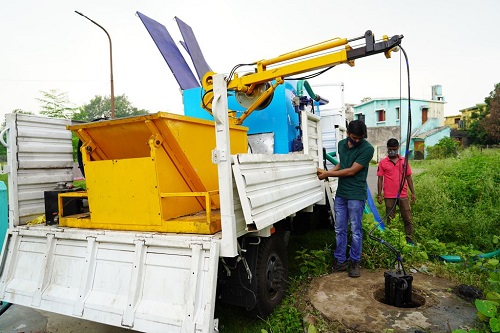Durgapur, West Bengal (ISJ): Central Mechanical Engineering Research Institute, CMERI – an engineering research development agency under CSIR has developed a mechanised scavenging system, which has undergone successful field trials at the premises of several public sector units.
The new system, suitable for diverse nature of India’s sewerage systems and manner of its chockages, sucks in Slurry Water after adequate filtration and redirects the same to clean the blocks using self-propelling nozzle. The CMERI technology provides in-situ option for mechanised scavenging as well as purification of water. The design is flexible to modify water filtration mechanism as per customised needs.
CMERI has developed three variants of prototypes of filtration units for different population density – (i) for narrow lanes and small dwellings; (ii) for residential complexes, townships and local bodies and; (iii) Vehicle-mounted integrated system for urban and local bodies.
The indigenous system is unique in several ways. It utilizes the slurry water for jetting operation, which reduces wastage of fresh water. Second, the optional self-propelled post-cleaning inspection system is another key feature.
The modular design ensures customized deployment according to situational requirements. The vehicle-mounted unit will be able to augment and use water from surface drain and flooded areas and purify it into water suitable for farming, household and drinking usages.
The technology has undergone successful field trials at the premises of the National Institute of Technology, Durgapur, National Power Training Institute of India, Durgapur, Durgapur Steel Plant (DSP), and Damodar Valley Corporation-Durgapur Thermal Power Station for assessment of functionality and effectiveness, said an official of CMERI.
Compared to imported mechanised scavenging system, CMERI developed system costs Rs. 500,000 for variant 1, Rs. 800,000 for variant 2 and Rs. 2500,000 for the vehicle mounted variant.
Manual scavenging is a scourge on humanity and a social evil in the caste-ridden Indian society. An estimated 1.2 million people, mostly women, are engaged in this inhuman practice and most of them belong to the socially backward classes.
Despite a law to ban manual scavenging, it is still prevalent in many parts of the country. According to the data collated by the National Commission for Safai Karamcharis (NCSK), one person died every five days on an average, while cleaning sewers and septic tanks across the country since 2017.
Image courtesy: CMERI, Durgapur


